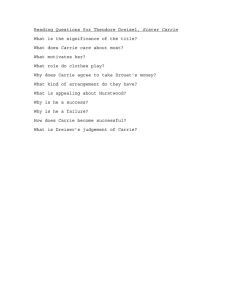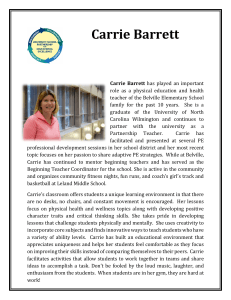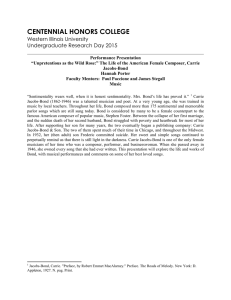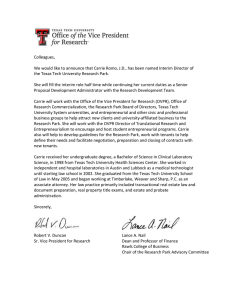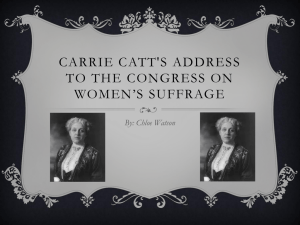Lecture 14: Sister Carrie and Self-Creation
advertisement
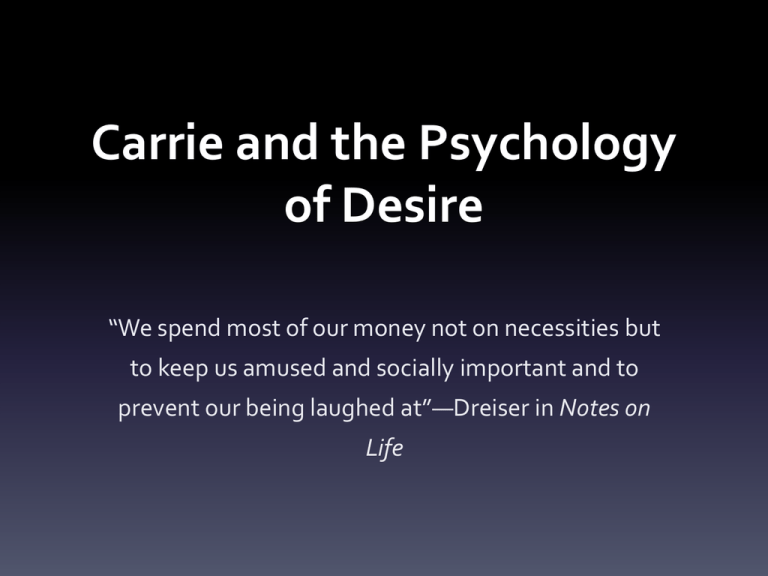
Carrie and the Psychology of Desire “We spend most of our money not on necessities but to keep us amused and socially important and to prevent our being laughed at”—Dreiser in Notes on Life Sister Carrie & Consumerism • Usually seen as a critique of the culture of consumption – Characters are “fragile selves” doomed to hollow, unsatisfying lives because of the dehumanizing effects of capitalism – They become commodities to each other and in the marketplace • Carrie is “arm candy” • Drouet is security • Hurstwood is prestige Consumer goods • The book is crammed with consumer goods—laces, food, shoes, jackets, etc – To make the setting more vivid and real for us – To document the economic history of that time – To make a social commentary on consumerism • What I’ll focus on—to bring together economic and psychological concerns in a new theory of the self. Turn of the Century Fashion The “Innate” Drive to Compare • Dreiser believed that the impulse to compare oneself to others is innate—instinctive • This instinct drives us to continuously compare and (hopefully) improve oneself – The self is thus never done. – There is no “True Self” at the core. • Maybe why the characters seem hollow – no core set of beliefs, or even much personality – just comparing, improving, creating an image inside and out Carrie’s Journey • Carrie’s bildungsroman, her education, is learning who to be – She isn’t just a helpless bit of driftwood in the marketplace, tossed, carved or mangled by everything around her • She creates herself proactively through the things she desires and through comparison with others Carrie isn’t fundamentally materialistic • Carrie’s longing for new things is not for the sake of the things themselves, not greed • She wants to be like the successful people—to be one of them • She’s always looking forward to new versions of herself she might be able to create, to greater self-perfection – It’s painful to go out and see that you are not as good as others, but Carrie faces it, and works to get to the next level Carrie As Actress • Carrie as actress arouses more desire in men than ever before • Drouet and Hurstwood are both desperate to have her after seeing her on stage • On stage she intensifies and speeds up the whole process by which she has created her identity • Compare, imitate, improve—not just one life-role but dozens on stage • A role can stimulate desire but never satisfy it because it’s a role, confined to the stage • On stage, she become desire in action Why Hurstwood Fails • Hurstwood looks back, and that’s why he crumbles – When he sees better-dressed and more confident men in New York, he hides and remembers his former glory. – Unlike Carrie, he fails to compare and emulate, so according to Dreiser’s theory of self-construction, he has no self. • he can’t face the painful truth that he’s not as good as some people Our ½ equipped little knight Why Carrie succeeds – Carrie can deal with the fact that others are better; in fact it motivates her • She doesn’t waste time on jealousy of better women— she just goes to work getting that • Drieser credits her with imagination – Her imagination is not just as a natural actress, but also in her ability to imagine new selves, new spheres for herself. Self-Creation • This process of self-creation can’t end • The goal is not consumption, but comparison and emulation – Satiation is not possible—there are always new standards for comparison • This is capitalism translated into selfhood: we must never be satisfied with what/who we are, or the economy/self will cease growing. Discussion • Find a quote where Carrie compares herself or her things to others’. • What’s her real motivation and what’s the outcome? • Do you agree that the tendency to compare is “innate” in her and in us?
